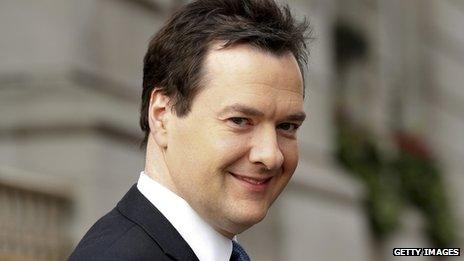Should the Treasury take housing risk?
- Published
- comments

The government's new mortgage guarantee scheme is ambitious.
If house-buyers were to take up all the guarantees on offer from the Treasury, some £130bn of new mortgages would be created - all of them with the home owners providing only a sliver of equity, and taxpayers on the hook for a little less than three quarters of losses, in the event that the price of the relevant houses were to fall 20%.
The Treasury estimates the potential or contingent liability for taxpayers at some £12bn.
Now to put all this into some context, that £130bn represents well over 10% of the stock of existing residential mortgages at the moment. And it is equivalent to a whole year's supply of gross mortgage lending by our big banks and building societies.
So if the initiative succeeds in attracting new buyers to the housing market - either first-time buyers who have struggled to find deposits, or existing homeowners whose housing equity has been wiped out by house-price falls - that would generate significant new demand for homes.
Which in theory would increase the number of housing transactions and the price of houses.
It is an intriguing policy for a number of reasons, not least because some would say it is counter-intuitive to tackle the problem of housing that's too expensive for young people by stimulating prices.
Also, there is a reasonable argument that in the boom years, the economy was too dependent on consumer spending, which in turn was generated in part by an over-heated housing market.
So although we may all be fed up with the economy's torpor, and would be keen for a bit of renewed growth, it is not clear that any growth sparked by a new housing-linked consumer boom would be altogether healthy.
Better, surely, to plough on with trying to rebalance the economy away from its dependence on a boom-bust consumer-spending cycle and towards investment and exports (however long and arduous that economic reconstruction may turn out to be).
By the way, given the scale of this housing market intervention, it is quite difficult to see how it can be withdrawn in three years, as per the current plan, even if the final decision on whether to pull it becomes the responsibility of the Bank of England - in that the shock to the market of ceasing this state-underwriting could be pretty severe.

George Osborne "has made a judgement on the health of the housing market"
However, for me, what is most interesting is the judgement being made by the Chancellor and the Treasury about the healthiness of the market.
They are in effect saying that the banks are wrong to have become more prudent mortgage lenders since the great financial crash of 2007-8.
As you know, before the collapse of the mortgage-backed bond market in 2007, banks routinely offered mortgages worth more than 90% of the value of a house - and even 100% mortgages were relatively common.
These days, such mortgages are few and far between. There has been a 95% fall in the number of mortgage products where the deposit could be as little as 5%.
Banks are behaving on the assumption that a further 20% fall in the price of UK homes is a realistic probability, and are protecting themselves against that eventuality.
And given how far and fast UK house prices rose in the boom years - trebling in the 10 years before 2008 - and how relatively little they have fallen since (less than 20% on average), it is hardly surprising that banks believe there could be some downside in this market (to use the ghastly jargon).
But the chancellor's actions seem to imply that the banks' caution is excessive.
He may be right.
But what is striking is that there is another market, the provision of credit to small businesses, which many would say is far more important to the UK's future wealth-creating prospects than the housing market and where the banks are even more reluctant to take risks.
In this market, however, the chancellor is signalling that the unwillingness of banks to provide new loans - as demonstrated by the shrinkage of credit creation, even with the benefit of subsidised funding from the Bank of England through the Funding for Lending Scheme - is merited.
Or to put it another way, he has no desire to take on the risks of lending to small businesses, if the banks are not prepared to take these risks.
George Osborne's preference for punting on the housing market rather than on small companies may be the prudent course of action to take, based on the country's economic history since the Second World War.
Or it may reflect a set of cultural and financial prejudices - houses deemed to be a better investment than proper wealth-creating entrepreneurs - that has been the UK's curse.